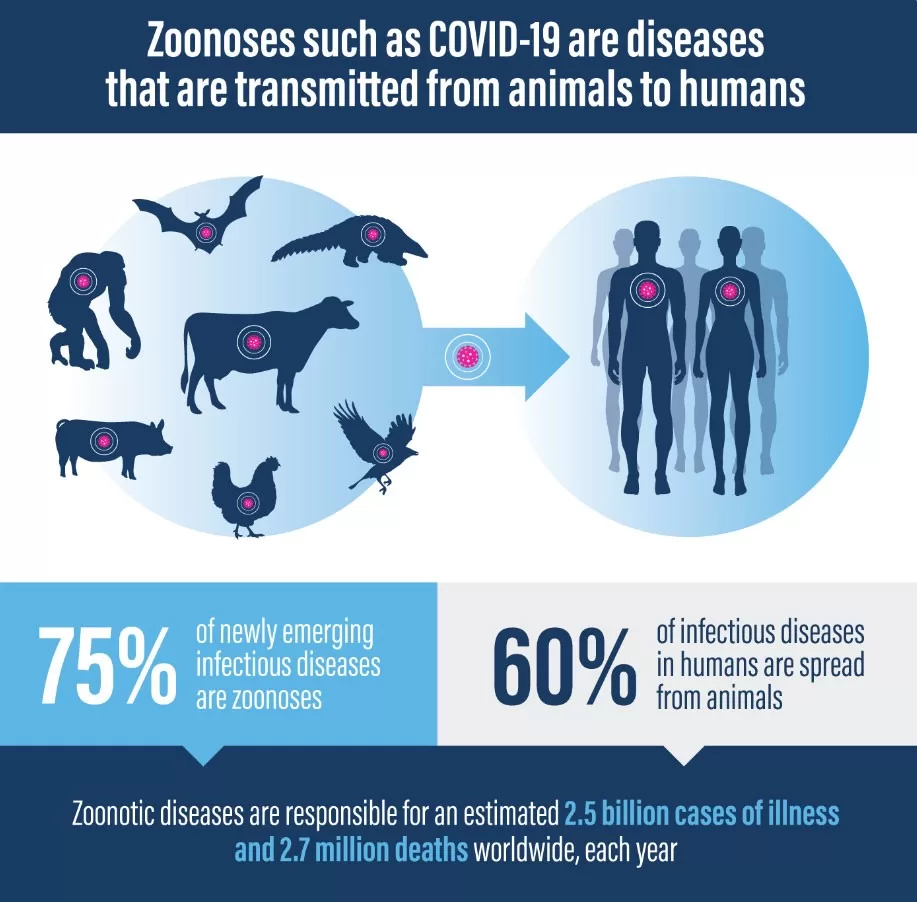Zoonotic diseases, which are illnesses transmitted from animals to humans, pose significant health challenges, especially in rural regions where human-animal interactions are frequent. Understanding zoonotic diseases through the One Health approach emphasizes the interplay between human health, animal health, and environmental health in tackling these infections. In areas like Tamil Nadu, where socioeconomic vulnerability and environmental factors greatly impact public health, raising awareness about zoonosis is paramount. Many communities remain unaware of these diseases and the preventative measures necessary for better health outcomes. This study explores the vital intersection of knowledge, practices, and environmental considerations related to zoonotic diseases in a rural population, highlighting the need for improved rural health awareness.
Diseases that jump from animals to humans, often referred to as zoonoses, can significantly affect human populations, especially in agrarian settings. The close coexistence of humans and wildlife or livestock in these environments can facilitate the spread of diseases, making awareness and preventive measures crucial. The One Health paradigm advocates for holistic strategies that integrate human, animal, and environmental health to address these challenges. In Tamil Nadu, targeted studies on zoonotic diseases shed light on the awareness levels among rural communities, underscoring the importance of education in mitigating health risks associated with these transmissible infections. Additionally, addressing the socioeconomic factors that contribute to vulnerability can enhance the effectiveness of interventions aimed at reducing the incidence of zoonotic diseases.
Understanding Zoonotic Diseases: A One Health Perspective
Zoonotic diseases, infections that can be transmitted between animals and humans, pose significant health risks globally, particularly in rural areas like Tamil Nadu. The One Health approach emphasizes the interconnectedness of human, animal, and environmental health, suggesting that addressing zoonoses requires collaboration across multiple disciplines. This perspective is especially pertinent in rural regions where human-animal interactions are more frequent due to occupational practices such as agriculture and livestock rearing, increasing the likelihood of disease transmission.
In rural Tamil Nadu, communities rely heavily on agriculture and are surrounded by diverse animal populations. This creates a fertile ground for zoonotic disease transmission, as pathogens can quickly move between species. For effective mitigation, public health campaigns and education initiatives must stress the importance of the One Health approach, integrating knowledge about zoonotic diseases into agricultural practices and animal husbandry to reduce vulnerabilities in these populations.
Socioeconomic Vulnerability and Environmental Health Risks
Socioeconomic factors significantly influence health outcomes, particularly in rural communities where resources may be limited. The Tamil Nadu study illustrates that individuals from lower socioeconomic backgrounds are more vulnerable to zoonotic diseases due to various risk factors, including poor sanitation, limited access to healthcare, and inadequate awareness of disease prevention practices. Consequently, addressing these socioeconomic vulnerabilities is crucial for improving health outcomes and reducing the burden of zoonotic diseases in these areas.
Environmental health also plays a crucial role in socioeconomic vulnerability. In Tamil Nadu, the presence of mosquito breeding sites and stray animals exacerbates the risk of zoonotic diseases. Environmental assessments conducted during the study highlighted a strong correlation between poor environmental health conditions and populations at greater risk. Hence, implementing interventions to improve environmental sanitation and control stray animal populations could significantly mitigate the threat posed by zoonotic diseases.
Raising Awareness of Zoonotic Diseases in Rural Communities
Raising awareness about zoonotic diseases and their transmission is essential for improving rural health outcomes. In Tamil Nadu, while a significant portion of the population demonstrated good knowledge of zoonosis, the application of this knowledge in daily practices was lacking. This gap highlights the need for targeted educational interventions that not only inform communities about zoonotic diseases but also engage them in practical, sustainable solutions to prevent transmission.
Community health campaigns can incorporate culturally relevant messages that resonate with local populations, emphasizing the importance of hygiene, responsible animal handling, and regular health checks. By fostering a better understanding of the connection between zoonotic diseases and everyday practices, these initiatives can empower rural communities to take proactive measures in safeguarding their health, ultimately reducing the incidence of zoonoses.
The Importance of a Multi-Disciplinary Approach to Zoonosis Prevention
The fight against zoonotic diseases requires a coordinated approach that encompasses multiple sectors, including veterinary health, environmental management, and public health. The One Health framework advocates for this collaboration, as health outcomes are not determined in isolation but are the result of diverse interactions between humans, animals, and the environment. In Tamil Nadu, creating cross-sectoral partnerships can enhance the effectiveness of zoonosis prevention strategies by ensuring that all relevant stakeholders are involved.
Engaging local farmers, veterinarians, environmentalists, and healthcare providers can help foster a shared understanding of zoonotic risks and the necessary preventive measures. Training programs and workshops focusing on One Health strategies can cultivate a community-oriented mindset, encouraging proactive disease prevention and forming a robust support network capable of responding effectively to zoonotic outbreaks.
Examining Attitudes and Practices Regarding Zoonosis
Attitudes and practices related to health and hygiene are critical determinants of disease prevention, especially in the context of zoonoses. Despite showing a reasonable level of knowledge about zoonotic diseases, individuals in the Tamil Nadu study did not always practice effective prevention strategies. This disconnect underscores the need for further investigation into the underlying causes of these attitudes, including cultural beliefs, access to resources, and previous experiences with zoonotic diseases.
Behavior change initiatives should focus on not only educating communities but also addressing barriers to adopting healthier practices. Engaging community leaders and influencers can aid in reshaping attitudes towards zoonosis prevention, making it more acceptable and attainable for individuals. By fostering positive health behaviors at a community level, the broader aim of reducing rural vulnerability to zoonotic diseases can be achieved.
Addressing Environmental Challenges in Tamil Nadu
Environmental health factors significantly contribute to the proliferation of zoonotic diseases. As observed in the study, environmental issues such as mosquito breeding sites and the presence of stray animals are prevalent in Tamil Nadu’s rural areas. Addressing these environmental challenges requires a multifaceted strategy that involves community engagement, improved waste management, and sustained efforts to control stray animal populations.
Effective collaboration between local governments, health organizations, and communities is essential for implementing environmental health interventions. Strategies such as community clean-up days or educational programs on waste management can significantly reduce breeding grounds for disease-carrying organisms, thereby helping mitigate the risk of zoonotic disease outbreaks. This proactive approach not only promotes better environmental health outcomes but also fosters a culture of responsibility within rural communities.
The Role of Public Health Education in Reducing Zoonotic Diseases
Public health education is vital in addressing the knowledge-practice gap identified in the Tamil Nadu study. While many participants exhibited good knowledge regarding zoonotic diseases, their practices did not always reflect this understanding. Tailored health education programs that emphasize practical actions, personal responsibility, and community health can play an instrumental role in transforming knowledge into effective prevention strategies.
Utilizing various communication channels, such as community workshops, radio broadcasts, and social media campaigns, can enhance outreach efforts. Tailored materials that resonate with local cultural contexts can improve engagement and efficacy, making health education initiatives more relevant and impactful. By committing to ongoing public health education, rural communities can better equip themselves to prevent zoonotic diseases, ultimately leading to improved health outcomes.
Leveraging Technology for Zoonotic Disease Surveillance
Integrating technology into public health initiatives can enhance the surveillance and response to zoonotic diseases. The Tamil Nadu study highlights the necessity of effective data collection and analysis in understanding the dynamics of zoonotic outbreaks. Utilizing mobile technology and apps can facilitate timely reporting of animal and human health events, enabling swift action to prevent diseases from spreading.
Moreover, leveraging data analytics can improve risk assessment models and help predict potential zoonotic disease outbreaks. Coupled with community participation, technology can empower local populations to take charge of their health surveillance, ensuring a more proactive approach towards managing zoonotic diseases. As technology continues to evolve, its integration into health frameworks provides an opportunity to enhance the effectiveness of the One Health approach in rural regions.
Interventions for Sustainable Health in Rural Populations
Developing sustainable health interventions is crucial for addressing the unique challenges posed by zoonotic diseases in rural populations like those in Tamil Nadu. These interventions should be holistic, focusing not only on disease prevention but also on improving overall socioeconomic conditions and environmental health. Programs that promote sustainable agricultural practices, such as integrated pest management, can reduce environmental health risks while simultaneously enhancing food security.
Additionally, establishing health cooperatives or community health groups can create support networks that facilitate education, resource sharing, and mutual assistance in health crisis management. By fostering community involvement in health initiatives, rural populations can become more resilient to zoonotic diseases, ultimately achieving a healthier, more sustainable future.
Frequently Asked Questions
What are zoonotic diseases and why should we focus on them from a One Health perspective?
Zoonotic diseases are infections that can be transmitted from animals to humans. Focusing on them from a One Health perspective emphasizes the interconnectedness of human, animal, and environmental health. This approach encourages collaboration across these sectors to better understand and mitigate the risks associated with zoonosis, particularly in vulnerable rural populations.
How do socioeconomic factors influence vulnerability to zoonotic diseases in rural areas?
Socioeconomic factors, such as poverty and limited access to healthcare, significantly influence vulnerability to zoonotic diseases in rural areas. In regions like Tamil Nadu, where communities often interact closely with animals and are exposed to environmental risks, these socioeconomic vulnerabilities can heighten the likelihood of disease transmission, necessitating targeted interventions from a One Health approach.
What role does environmental health play in the spread of zoonotic diseases?
Environmental health plays a crucial role in the spread of zoonotic diseases, as it encompasses the ecological conditions that facilitate disease transmission. Issues such as mosquito breeding and the presence of stray animals increase the risk of zoonotic disease outbreaks. Addressing these environmental health factors is essential for controlling zoonosis and protecting rural communities.
How can rural health awareness campaigns reduce the risk of zoonotic diseases?
Rural health awareness campaigns can significantly reduce the risk of zoonotic diseases by educating communities about prevention strategies and personal hygiene practices. Such initiatives can enhance the understanding of zoonotic transmission pathways, fostering safer interactions between humans and animals, and ultimately improving health outcomes by promoting a One Health approach.
What findings were revealed in the Tamil Nadu zoonosis study regarding knowledge and practices about zoonotic diseases?
The Tamil Nadu zoonosis study revealed that while a majority of participants had good knowledge about zoonotic diseases, this did not translate into positive attitudes or practices. There was a significant gap indicating that although education was present, practical application in daily life was lacking. Therefore, targeted interventions are necessary to bridge this gap and enhance rural health behavior.
| Key Points |
|---|
| Study focused on assessing vulnerability and awareness of zoonotic diseases in a rural population in Tamil Nadu, India. |
| Cross-sectional study conducted from July to December 2024, involving 408 participants. |
| 1. Socioeconomic factors: Significant proportion from lower middle class and involved in agriculture. |
| 2. Environmental factors: High occurrences of mosquito breeding and stray animals identified. |
| 3. Knowledge: 79% demonstrated good knowledge about zoonotic diseases. |
| 4. Attitudes & Practices: Only 24% showed a positive attitude and 26% engaged in good practices. |
| 5. Vulnerable population: Higher knowledge found in older individuals and pet owners, but practical applications were lacking. |
Summary
Zoonotic diseases pose a significant threat to public health, especially in rural areas where human-animal interactions are frequent. This study highlights the vulnerability of rural populations in Tamil Nadu, India, and emphasizes the need for improved awareness and practices regarding zoonotic diseases. Bridging the gap between knowledge and behavior is crucial for effective prevention and control, ensuring better health outcomes for communities at risk.
The content provided on this blog (e.g., symptom descriptions, health tips, or general advice) is for informational purposes only and is not a substitute for professional medical advice, diagnosis, or treatment. Always seek the guidance of your physician or other qualified healthcare provider with any questions you may have regarding a medical condition. Never disregard professional medical advice or delay seeking it because of something you have read on this website. If you believe you may have a medical emergency, call your doctor or emergency services immediately. Reliance on any information provided by this blog is solely at your own risk.








